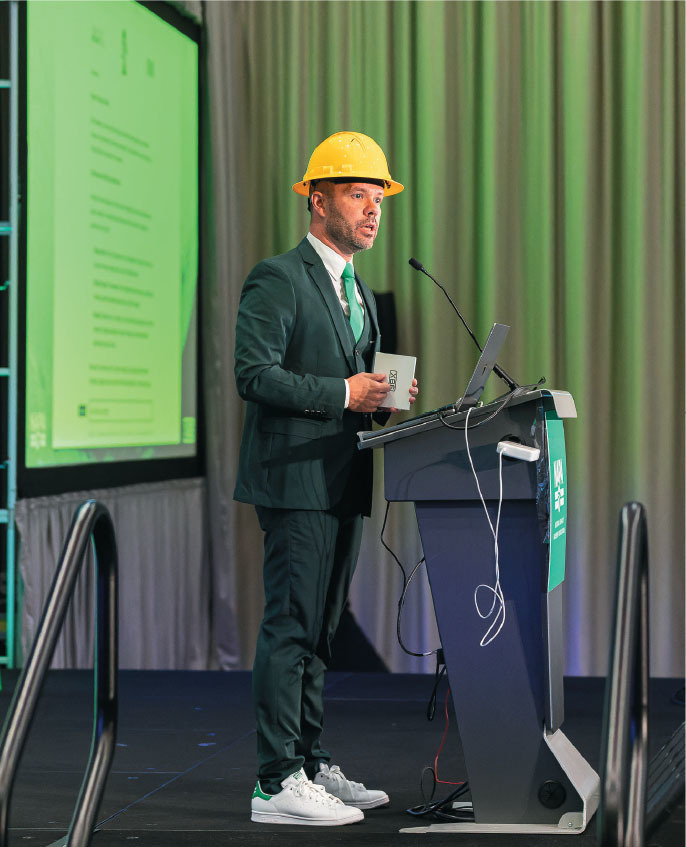Women in the Workforce: Recruit, Retain, and Promote

Data doesn’t lie. Women make up just 10 percent of the construction workforce – and yet nine in 10 contractors are looking to hire new employees. So why is the construction industry overlooking half the population?
Without major changes in recruiting, retaining, and promoting women, the industry will not survive. Diversity and inclusion are not something that can be pushed down the road any further.
At CONEXPO 2023, a panel of four women and one man shared how they are driving this needed change – and how other companies can listen and learn how to do the same. Everyone agreed that is it one thing to say we want women working in our industry, it is quite another to make them feel welcome.
For a male-dominated industry, making women feel welcome can be as simple as having clothing and safety gear on hand that fit women.
But how to first get women in the door to wear that safety gear is more complex.
RECRUITMENT
The panel shared how they recruit women – and for many, it starts with going to local high school career fairs to show girls that they have a place in the asphalt pavement industry.
“I can see it in those girls’ eyes when they see, ‘Ah, you look like me. I can go work for you,’” said panelist Ashly Rieman, Project Manager at Milestone Contractors LP.
Panelist Latrell Cates, HR Business Partner/EEO Officer at Reeves Construction Company, agrees.
“People are really drawn to those you can relate to. People see women and see themselves in this industry.”
There are also many industry resources directed at recruiting women. Women of Asphalt (WofA), the Society of Women Engineers (SWE), and the National Association of Women in Construction (NAWIC) are a few of the larger resources that can be used in connection with job boards and state DOTs to reach women.
RETAINMENT
Once a company is lucky enough to bring women on boards, the real work starts. For many, male and female, the asphalt pavement industry is one that requires learning on the job. Many jobs do not require any higher education or specific training – companies can train anyone to do anything. But with women, there are some unique challenges that companies need to first be aware of.
For example, when panelist Shawn Boyce, Chief Revenue Officer at Brothers Paving & Concrete, first started hiring more women, he found that many women were not advocating for themselves, despite being “super qualified.” This led him to create a clear path forward for everyone, to ensure all could see their road to advancement. “Everyone, man or woman has the exact same opportunity,” he said.
Rieman, too, saw that women were not speaking up and decided to step in to help. She met with crew foremen before a woman was added to a crew, acknowledging the change but reminding them to hold women to the same standard as the men. She also asked for the foremen to give clear guidance and support – finding that job shadowing helped many women gain the confidence they needed before jumping in. She found that every women responded differently.
“Ask woman what they want to do – lifting heavy things for example – don’t shove them off in a corner or keep them as lifelong flaggers,” Rieman said.
“Women are stronger than you think.”
Boyce recalled a woman at his company asking him why women were not advancing as quickly as men. He knew this was a big problem – not with the women but with the company. He created a mentorship program, where any new woman hire was paired with a seasoned worker. Boyce knew that if he showed the women how to advance, they would succeed. Part of the change included a new training program where they would build a ‘test road’ to give women the opportunity to get on the heavy machines and learn the skills without messing up a job. “It does cost money, but the reward is really, really great,” he said.
PROMOTION
Panelist Mary Katherine Harbin, VP Foothills Division at Maymead Inc., has built a culture of inclusion to help women not only gain the skills needed to advance, but also to train the entire crew to look out for the next generation of leaders. By having mid-level management always looking for a talent pipeline on the job site, the company is able to encourage women to apply for higher-up positions while offering training and support to encourage success.
To help foster women stepping up, Harbin’s company created an all-women paving crew in 2018 to attract and train women. They ran ads for the program, letting women know that everyone was welcome, no background needed. The response was great, but the real success came when the women had the opportunity to try new things they otherwise may not have. Most machines, no matter the size, are run with a keypad, she said, and the all-women paving crew thrived. It made her ask, “Why do people think we can’t do this? And what are we putting out there where women think they can’t run these machines?”
Part of management’s responsibility is to offer different career paths and identify the high potential workers, Cates said. With women, she found this to be even more vital, as many women don’t boast about their skills enough. Her company has had success with creative internal job postings combined with in-person conversations with crew leaders encouraging women to apply for a job they may not otherwise have considered. “That should start even if they are a laborer,” she said. “Have conversations with your employees.”
THE ROAD AHEAD
Women can do any job in this industry – and most end up loving it. But there is still a long road ahead and stereotypes to overcome. For this panel of leaders, they hope to inspire other companies to take some of what was shared and start finding ways to reach the entire potential labor pool.
“The pool is bigger if you look at it as a whole,” said moderator Rachel Quam, Americas Area Manager – Paving Products at Caterpillar.
Social media posts showing women working in a variety of situations can help women to see themselves and realize they can do the work. “It is going to pique someone’s attention somewhere,” Boyce said. “There is a big labor pool out there, you just have to find them.”
Harbin said that everyone needs to get on the same page to increase the workforce pool, especially with helping women is to see themselves in all positions. “The responsibility of us women in the industry to self-promote and show that we are proud of what we do,” she said. “This is no longer an industry that is the boys club. You can come here and be safe and be welcome and be promoted.”
TIPS FOR RECRUITING, RETAINING, AND PROMOTING WOMEN
ANONYMOUS SCREENING
When screening job candidates for hiring or promotion, hide the name and sex/gender of applicants to reduce unconscious bias.
WOMEN ARE NOT ALL THE SAME
A 50-year-old woman and a new graduate are going to want and need different things professionally. Women workers can’t all be lumped together. Talk to each of your employees about their goals and what they value in a company. For some it may be working overtime to earn more money; others may want more flexible schedule. Always ask.
NEXT GENERATION
The next generation is less mechanical than most before – both men and women – so start with the basics and have clear training schedules set. Allow women to gain confidence in one task before moving on to the next to help grow confidence.
ACKNOWLEDGE ACHIEVEMENTS
Women may be less likely than male counterparts to speak up about their career goals. Be sure to acknowledge hard work and encourage women to apply for jobs/promotions they may not otherwise seek.
DEI: HOW TACKLING ‘WOMEN’S ISSUES’ EVOLVES THE INDUSTRY FOR EVERYONE
Diversity and inclusion are keys to the future of the asphalt pavement industry. As more women join job sites, changes will be needed to ensure a culture that meets their needs. The good news is that these changes will lift up the entire industry.
ATTRACTING WORKERS
When writing a job description to attract women, be sure the person you hire is the right fit and not just a hire to fill a quota. All applicants should be treated equally. Be clear that many jobs require no previous experience – and that training will be offered to advance. This practice will not only encourage more women to apply, but will also likely bring new eyeballs from men seeing the industry with a new perspective.
MENTAL HEALTH
The suicide rate in the construction industry is five times greater than all deaths in the industry. Provide mental health support for all workers and awareness training for managers. Women, men, and your company will benefit from these programs.
WORK-LIFE BALANCE
Historically, our industry has been one where long work weeks were not uncommon. Putting in seven days a week, not taking vacation or sick time, and missing important family events were all necessary to get the job done. Today, companies are embracing ways to allow workers to take time off or stay home when ill. Women and men – and the companies that employee them – all benefit from this approach to work-life balance. And it’s critical to recruiting the next generation of workers who insist on it.





This article had me hooked! For further reading, check out: DISCOVER MORE. What are your thoughts?